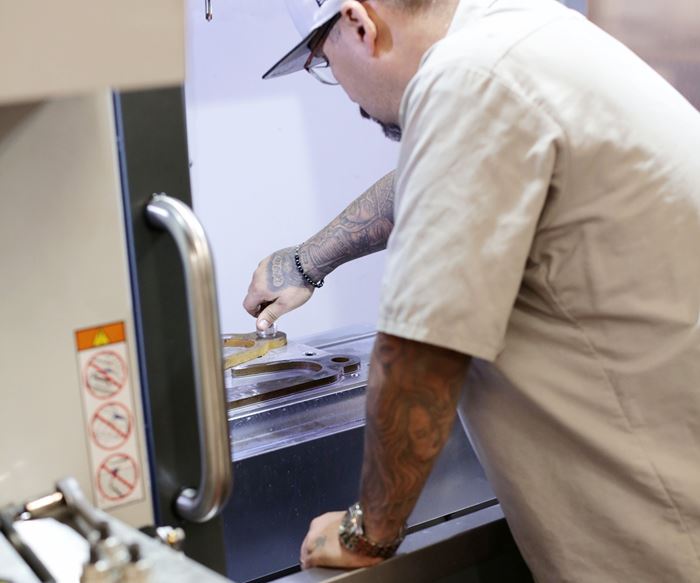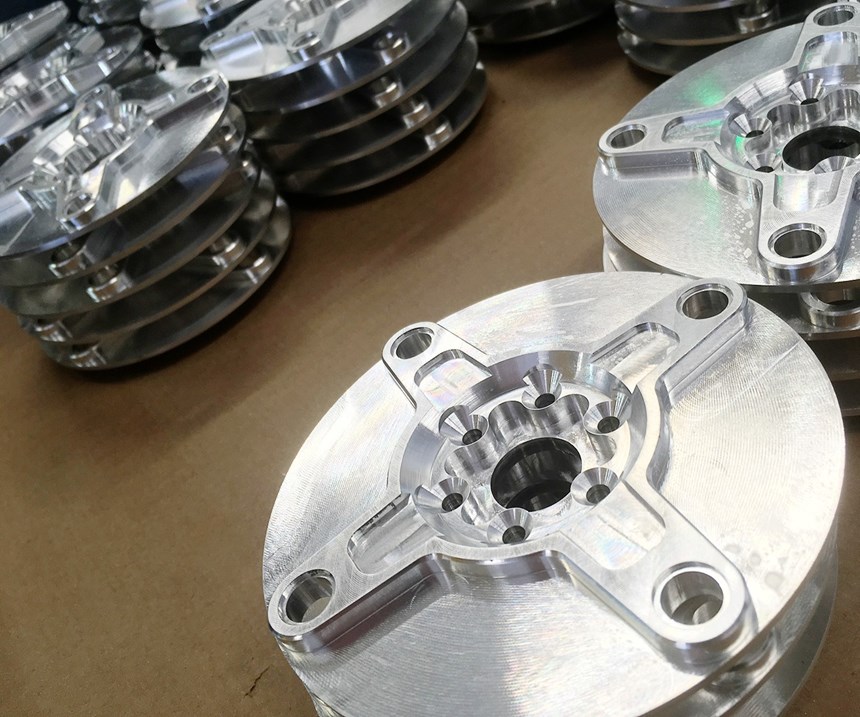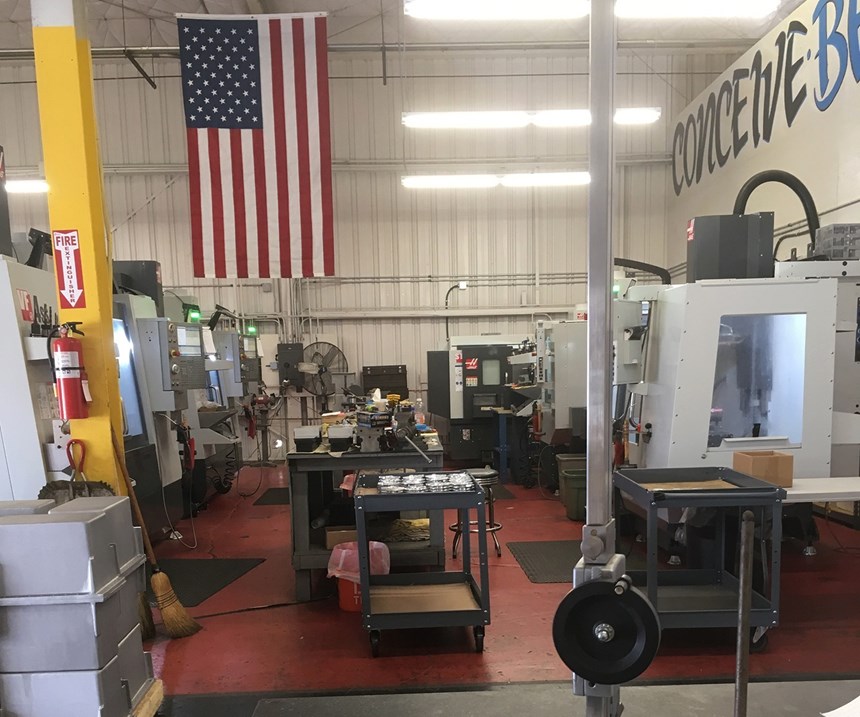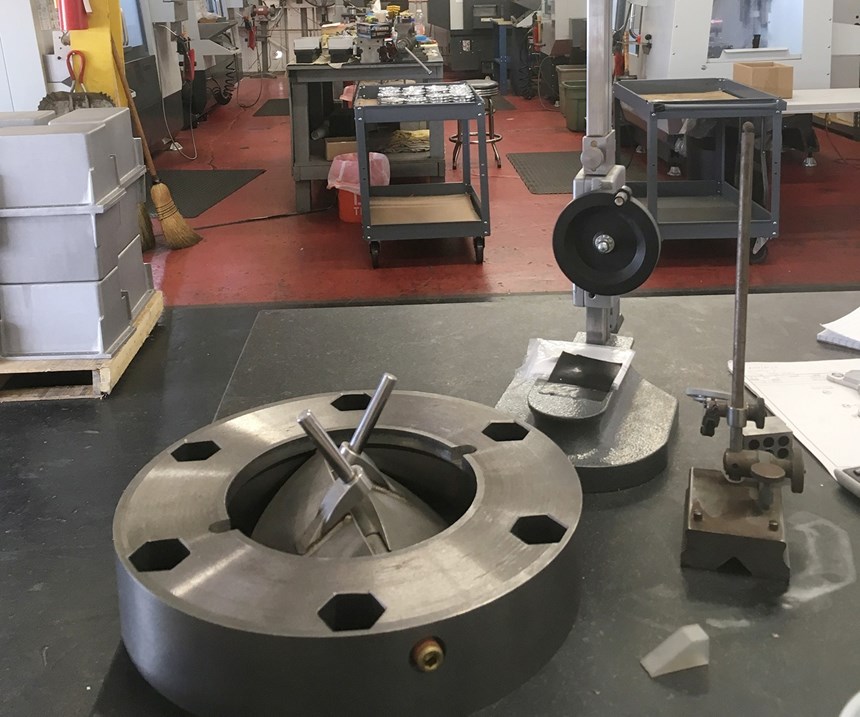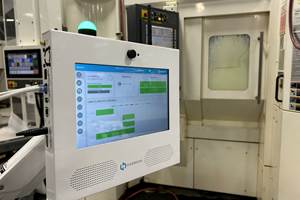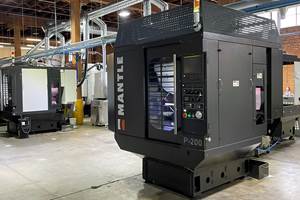Share




Rise Up Industries is a non-profit organization in Santee, California, that is built upon an 18-month program that provides CNC-machine-operator training for ex-gang members who are exiting prison as well as life-skills training, real-life exercises in work ethics and additional forms of support.
The machine operator program functions as a working machine shop that is committed to customer satisfaction by focusing on completing orders to specification and on time. The program is inspired by mottos such as “make the rest of your life the best of your life” and “a place to belong.” Its supporters believe that in its own way, Rise Up is making a contribution to filling the skills gap in the local manufacturing industry. Around the country, similar programs have improved the chances that individuals leaving prison can successfully transition into responsible, independent lifestyles.
Retiree Joe Gilbreath came up with the idea of Rise Up’s machine shop after working with the Kairos prison ministries program that helps prisoners turn their lives around. Through the program, he met Father Greg Boyle, who founded Homeboy Industries, an organization that heavily influenced Rise Up’s basic concept.
“The number one reason that youth give for joining a gang is to have a place to belong,” Mr. Gilbreath says. “They are making life-and-death decisions to join gangs at age 10 because they believe they do not belong. This is America, the land of opportunity. We can do better than this,” he contends.
Before coming to Rise Up to help teach participants, Dustin Greeves, the program’s machine shop manager, had experience running a shop. “Moldmaking and tool making—I grew up in it,” Mr. Greeves explains. He draws advice and insight from this experience. “My grandfather owned his own shop for 25 years, and I tell these guys that this trade will give them everything they give it,” he says.
“I’ve managed tool rooms, and generally, the guys I was managing were class-A tool makers,” Mr. Greeves recalls. “I would simply say ‘here’s the mold, go build it.’ In his position with Rise Up, he has adopted a new approach tailored to the special needs of its participants. The training program follows a different business model as well.
For example, the program, which is described as a “social enterprise,” gets most of its jobs by word-of-mouth. Until it meets certain business objectives, such as becoming ISO-certified and adding more manual equipment, the shop’s focus is on the students. Though revenue from the job shop work is important, the priority is training participants, not maximizing production rates.
Likewise, before acceptance into Rise Up, candidates must take certain steps. “They have an interview and take a psychosocial assessment, but the true test is to have them go on shop floor,” Mr. Greeves explains. The vetting process is pretty intense, he says, noting that participants may have spent as little as 22 months in jail or as many as four decades. He believes that regardless of how much time a candidate may have been incarcerated, an earnest commitment to change is essential. The level of that commitment becomes apparent in the machine shop setting, he says, and he believes it is the best indicator of a participant’s likelihood of success.
The Parts Are Real
Some example workpieces made by trainees are displayed at the shop. They include components for many applications, such as those for the military and the medical industry as well as recreational products like BMX racing bikes. Mr. Greeves often points to a fire hydrant shut-off valve that has an unusual but revealing story.
He explains that this valve is designed to sit underneath a fire hydrant, where it is held open mechanically. If the fire hydrant is accidentally sheared away at the base, water pressure activates the valve to shut off the flow instantly. Trent Kitchen, a former inmate once serving a long sentence, invented it. He came up with the idea after seeing the efforts of firefighters in the aftermath of the 9/11 terrorist attacks in New York City. The product, now patented, will be called The Shield. Firefighters at the nearby Carlsbad Fire Department are already interested in it.
Mr. Greeves says the valve is displayed prominently because it is one of many points of inspiration for those benefitting from the Rise Up program. Partially machined in Rise Up’s machine shop, the valve serves two purposes as a display item. It demonstrates the value of machining processes in bringing a needed and useful product to the real world. It also demonstrates how a good idea springs from a creative mind regardless of a person’s background, proving that no one should think that their background might restrict their imagination.
The People Are Real
“I got bills, and I was never a responsible person before,” John Villa says. Mr. Villa is a current program participant and was once sentenced to life in prison. “I would just go out and take money from someone. So now, I’m not that person anymore,” he says. Testimony from trainees like this has compelled managers at Rise Up to make housing assistance a main focus for the program. Housing assistance has been a key issue for success in other reentry programs, so making it a priority is warranted, Mr. Greeves explains.
Another issue is pay, because some Rise Up participants must work multiple jobs to make ends meet. “Program participants earn minimum wage upon enrollment, and that’s something we eventually would like to change,” Mr. Greeves explains. “We understand that it’s almost impossible to live on that wage rate in the San Diego area, so it’s these types of struggles we deal with. It’s not easy,” he says. However, he believes that participation in the program has real, tangible value, as a comment from Mr. Villa bears out.
He says there was a time when he thought about leaving, but he chose not to because he felt that the place is like family, adding that he must work three jobs to stay in the program. “They’re letting out thousands of us now, and we’re the new minority,” Mr. Villa continues. “We’re all different colors. The public doesn’t know. It’s not like the movies.”
To change this perception and help outsiders understand his motivation, Mr. Villa offers this explanation. “It’s not like ‘December 1, 2020, I get to go home.’ When you have a life sentence, you never get to go home. But if you make the changes, and you are able to prove your actions, then you might be able to get out.”
For his part, Mr. Greeves is forthright about this reality. “We tell these guys, they know the stigma that they have attached to them. They understand it,” he says. For this reason, keeping participants motivated and hopeful is a key part of his job, Mr. Greeves says. “I tell them they train me as much as I train them.”
The Lessons Are Real
Trainees in the Rise Up program not only learn how to use a machine to make parts, but also they go through a series of life-skills courses. Once accepted to the program, each trainee is assigned a case manager and mentor with whom they have weekly contact. The case manager helps participants enroll in a health care system, obtain a driver’s license or other state identification, register with a career center and gather housing referrals. In addition, participants get financial literacy training from U.S. Bank, tax-prep assistance, and opportunities to take part in community service projects such as Father Joe’s Villages, which provide programs and housing for San Diego’s homeless. For those interested, a Friday book club is an activity that boosts reading levels, reinforces social skills and stimulates critical thinking.
Participants have weekly reviews of their performance, and when they have reached the one-year mark in the program, they are given a special assessment. Because they have only six months left at this point, the assessment is designed to identify the areas at which they excel and those at which they can improve. They are also advised about the positions in the manufacturing industry that seem to be the best fit for them. “Everyone in this business, as you know, has different skill sets,” Mr. Greeves points out. “Some guys are perfectly fine just operating machines, and some guys may want to do something else.” He notes that Rise Up is not intended to pigeonhole individuals into machining careers.
Real Progress, Real Success
In May 2016, Rise Up hosted an open house seeking to raise $470,000 to add equipment, take on new trainees and move to a bigger facility. The event was successful, and one year later, the organization was able to move into its current location in Santee, a northern suburb of San Diego. This accomplishment was three months ahead of schedule. Since then, the shop has procured dozens of customers, Mr. Greeves reports. The shop was entrusted with one CNC mill from Haas Automation and has purchased three additional CNC mills plus a Haas lathe. In addition, Mastercam. provided four free seats of its CAD/CAM software.
An open house in November 2017 included attendees such as Santee Mayor John Minto; Miss Santee Jennae Gonzalez; San Diego County District Attorney Summer Stephan; Catholic Bishop Emeritus Robert H. Brom; and Donovan State Prison Chief Deputy Warden Patrick Covello. Mr. Greeves says this open house was effective in enabling public figures to discover what is going on in their neighborhood and learn how Rise Up enriches Santee.
However, he insists that the success of Rise Up must be measured by the success of individuals who complete the program, overcome social adversity and move on to jobs in manufacturing. One example he cites is that of a recent graduate who now works at Peacock Tool and Engineering, in Spring Valley, California. Mr. Greeves notes that he is doing a great job and that everyone associated with Rise Up is proud of this graduate.
Yet even before graduation, participants have a lot to say about the benefits of the program. For example, Angel Ramirez, a senior trainee with the program, describes the transformation that it has given him after spending 41 years in prison. “Our core values at Rise Up remind us to be humble, considerate, compassionate, honest, loyal and to help others,” Mr. Ramirez says. “This company will engrain ethics that any employer who hires any one of us would want to have in an employee.” Mr. Ramirez adds that each trainee at the Santee shop puts his heart into every product that goes out the door.
“Prison life is behind me,” Mr. Ramirez says. “I’m being helped by Rise Up to be free from those horrible memories and to make new memories. Conceive, believe, achieve.”
To Mr. Greeves, this final statement from a trainee hits at the core of what this program was established to do.
Inspiring Support
Visitors from the industry are often inspired by what they see and hear at Rise Up, Mr. Greeves says. A good example he cites is a recent visit by Greg Mercurio, president of Shop Floor Automations, a manufacturing integrator based in La Mesa, California. Mr. Mercurio heard about Rise Up while planning activities to mark his company’s 20th anniversary. “I was looking for a special way to mark this milestone by giving something back to the industry and the community,” he says. “I was intrigued by the concept behind Rise Up because it touches two key concerns of mine—the skills gap that is holding back U.S. machine shops and the false impression held by many people outside our industry that factories are dark, dirty dungeons.”
Mr. Mercurio spent two hours touring the facility and talking to managers as well as trainees currently in the program. “The experience changed my perception,” Mr. Mercurio recalls. “I thought we could help by simply donating one of the solutions that Shop Floor Automations offers to the machining industry. As it turned out, the Rise Up machine shop wasn’t far enough along in its development to be ready for any of these solutions. Mr. Mercurio offered a cash donation instead.
However, seeking to do more, Mr. Mercurio learned about other ways individuals and companies like his can support Rise Up Industries. “There are many ways people can help,” he says. “For example, givingtuesday.org will match donations, dollar for dollar, up to $100,000. You can also download an app called CoinUp, which will donate spare change from credit card charges to a charity of your choosing.” Mr. Mercurio also reports that the most casual way to contribute to Rise Up is by shopping on Amazon. “By using AmazonSmile, the site donates a portion of the profits to a charity and your cart total stays the same. Just make sure you choose Rise Up as the designated charity of choice, and make sure you’re logged into AmazonSmile before checking out,” he says.
Mr. Mercurio admits that his advocacy on behalf of Rise Up is also motivated by his concern that if manufacturing jobs go vacant, it could mean less business for Shop Floor Automations. Even beyond that, he wants his own two young daughters to understand the value of manufacturing and that machine shops are bright, clean and open. “The Rise Up shop is an inspiration on all those levels,” he concludes.
Related Content
Workholding Fixtures Save Over 4,500 Hours of Labor Annually
All World Machinery Supply designs each fixture to minimize the number of operations, resulting in reduced handling and idle spindle time.
Read MoreCan Connecting ERP to Machine Tool Monitoring Address the Workforce Challenge?
It can if RFID tags are added. Here is how this startup sees a local Internet of Things aiding CNC machine shops.
Read MoreIn Moldmaking, Mantle Process Addresses Lead Time and Talent Pool
A new process delivered through what looks like a standard machining center promises to streamline machining of injection mold cores and cavities and even answer the declining availability of toolmakers.
Read MoreManufacturing Madness: Colleges Vie for Machining Title (Includes Video)
The first annual SEC Machining Competition highlighted students studying for careers in machining, as well as the need to rebuild a domestic manufacturing workforce.
Read MoreRead Next
Building Out a Foundation for Student Machinists
Autodesk and Haas have teamed up to produce an introductory course for students that covers the basics of CAD, CAM and CNC while providing them with a portfolio part.
Read More5 Rules of Thumb for Buying CNC Machine Tools
Use these tips to carefully plan your machine tool purchases and to avoid regretting your decision later.
Read MoreSetting Up the Building Blocks for a Digital Factory
Woodward Inc. spent over a year developing an API to connect machines to its digital factory. Caron Engineering’s MiConnect has cut most of this process while also granting the shop greater access to machine information.
Read More


